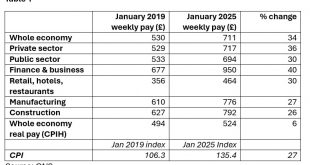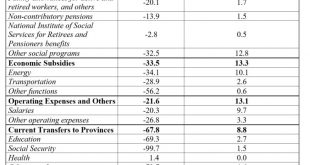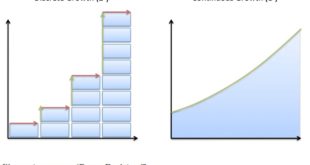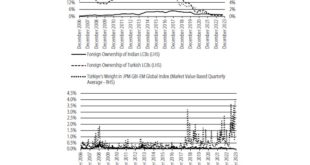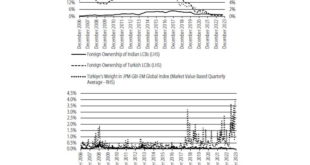Today (Thursday), the Office for National Statistics published its monthly set of employment stats. While its Labour Force Survey has been under the cosh for some time for unreliability, the ONS’s data on average wage rates and changes retain their importance. The data – this time for January 2025 – covers average total pay, regular pay and bonus pay for the whole workforce. It also provides average wage data by broad sector.The ONS also publishes its estimate of ‘real pay’ after taking...
Read More »Argentina’s Economic Shock Therapy: Assessing the Impact of Milei’s Austerity Policies and the Road Ahead
By Cem Oyvat, T Sabri Öncü and Joel RabinovichA slightly edited version of this article first appeared in the Indian journal, Economic & Political Weekly, on 15 February 2025.Cem Oyvat ([email protected]) teaches economics at the University of Greenwich. T. Sabri Öncü ([email protected]) is an independent economist based in İstanbul. Joel Rabinovich ([email protected]) teaches international political economy at King’s College London.IntroductionArgentina’s political and economic landscape...
Read More »The Poverty of Neo-liberal Economics: Lessons from Türkiye’s ‘Unorthodox’ Central Banking Experiment
T. Sabri Öncü and Güney DüzçayThis article first appeared in the Indian journal, Economic & Political Weekly, on 14 September 2024. Güney Düzçay ([email protected]) and T. Sabri Öncü ([email protected]) are economists based in Türkiye.Historically, central banks, like the Bank of England, were primarily established to finance wars and manage government finances—serving as the “government’s bank.” Later, they evolved to address commercial and financial crises through their role as lenders...
Read More »Global Economic Governance: What’s “Growth” Got to Do with It?
An obsession with growth has generated massive inequality, undermined global economic stability, and weakened faith in democracy. Reversing these trends requires reining in the power of financial capital and managing global trade flows.This essay is part of a series of articles, edited by Stewart Patrick, emerging from the Carnegie Working Group on Reimagining Global Economic Governance. It was first published on 17 July 2024 on the Carnegie Endowment website.“Growth” is a term used by...
Read More »From Chile in 1973 to Argentina and Türkiye in 2023: Economic Genocide Continues
In Memory of Andre Gunder FrankA slightly edited version of this article first appeared in the Economic & Political Weekly on 11 May 2024.Economic GenocideThe concept of economic genocide originated in an article published in 1976 in this journal [Economic & Political Weekly]. In his open letter titled “Economic Genocide in Chile: Open Letter to Milton Friedman and Arnold Harberger,” Andre Gunder Frank (1976) gave a brief summary of the Chicago-style economic policy the military...
Read More »Prime 1970-01-01 00:00:00
[unable to retrieve full-text content]
Read More »India’s Inclusion in the JP Morgan GBI-EM (bond) Indices
A Path to Eden or Just Another Sin? Güney Düzçay and T. Sabri Öncü This article first appeared in the 24 November 2023 issue of the Indian journal, Economic and Political Weekly. Introduction The concept of “original sin” was introduced by Eichengreen and Hausmann (1999), defining it as “a situation in which the domestic currency cannot be used to borrow abroad or to borrow long term, even domestically.” Subsequently, Eichengreen et al. (2003) redefined the concept as a country’s inability...
Read More »India’s Inclusion in the JP Morgan GBI-EM (bond) Indices
A Path to Eden or Just Another Sin?Güney Düzçay and T. Sabri ÖncüThis article first appeared in the 24 November 2023 issue of the Indian journal, Economic and Political Weekly.IntroductionThe concept of “original sin” was introduced by Eichengreen and Hausmann (1999), defining it as “a situation in which the domestic currency cannot be used to borrow abroad or to borrow long term, even domestically.” Subsequently, Eichengreen et al. (2003) redefined the concept as a country’s inability to...
Read More »India’s Inclusion in the JP Morgan GBI-EM (bond) Indices
A Path to Eden or Just Another Sin?Güney Düzçay and T. Sabri ÖncüThis article first appeared in the 24 November 2023 issue of the Indian journal, Economic and Political Weekly.IntroductionThe concept of “original sin” was introduced by Eichengreen and Hausmann (1999), defining it as “a situation in which the domestic currency cannot be used to borrow abroad or to borrow long term, even domestically.” Subsequently, Eichengreen et al. (2003) redefined the concept as a country’s inability to...
Read More »Monetary Policy Debates in the Age of Deglobalisation: the Turkish Experiment – III
A slightly edited version of this article first appeared in the Economic and Political Weekly on 22 July 2023. Summary: This article is the third and last in a series of articles on monetary policy debates in the age in which deglobalisation became a buzzword. Here, we continue our discussion of the ongoing Turkish monetary policy experiment by focusing on macroprudential measures, capital controls and central bank independence, as promised in the first article, as an example of these...
Read More » Prime, Policy Research in Macroeconomics
Prime, Policy Research in Macroeconomics

